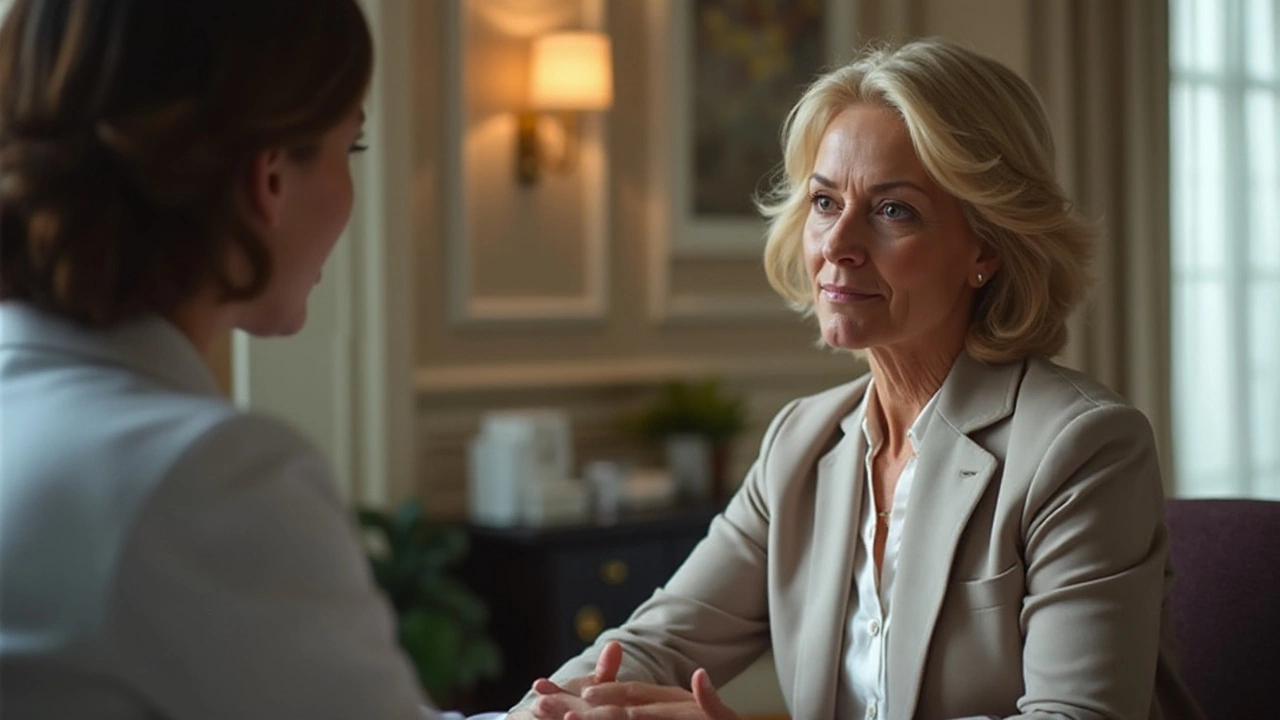 Jan, 15 2025
Jan, 15 2025
In recent years, cosmetic surgery has transitioned from being a taboo topic to a mainstream conversation in the UK. But who exactly is heading to clinics, eager to go under the knife for beauty's sake? This fascinating question unveils layers about our society and the evolving standards of attractiveness.
Diving deep into the realm of surgical enhancements offers a glimpse into the choices of those willing to alter their appearances. From young adults to those embracing the golden years, understanding who is opting for these procedures and why reveals much about current cultural trends.
- Who Seeks Cosmetic Surgery?
- Popular Procedures in the UK
- Age and Gender Demographics
- Motivations Behind Enhancements
- Societal Impact and Perceptions
- Future Trends and Considerations
Who Seeks Cosmetic Surgery?
In the vibrant landscape of the UK, cosmetic surgery has become more than just an aspirational dream for many; it's a tangible reality embraced by a diverse cross-section of society. Delving into the demographics reveals that one of the most surprising groups turning towards these procedures includes men. Once considered a domain predominantly occupied by women, the increase in male participants has been significant. According to experts, the rise in men opting for procedures can be attributed to societal shifts and changing perceptions of masculinity.
Women, historically the more likely recipients of cosmetic enhancements, continue to seek these procedures, but their motivations have evolved too. While the pursuit of beauty remains central, self-care and self-confidence play crucial roles. From urban professionals to stay-at-home parents, women in their 30s and 40s often look to enhance their appearances, with minimally invasive treatments such as Botox or fillers being particularly popular. Beauty enhancements have essentially become an extension of modern lifestyle choices.
Interestingly, a newer group on the rise are young adults in their late teens and early twenties. This demographic, heavily influenced by social media's portrayal of beauty, often seeks cosmetic surgery to correct perceived imperfections early in life. While some might argue it's about fitting into certain beauty archetypes, for many, it's about expressing individuality and standing out in a digitally-shared world. Education, awareness, and the normalization of procedures in media contribute significantly to this trend.
Moreover, as people live healthier and longer lives, older adults are also catching on to the cosmetic trend. Many over the age of 50 seek procedures not necessarily to look younger, but to look as good as they feel. This shift underscores a move towards embracing age positively, with many seeking treatments like facelifts and eye-lifts to maintain vitality. This age group’s demand is making waves in the industry, prompting innovations tailored towards mature skin and structures.
"There’s a growing consensus among older adults that age should reflect wisdom and experience, not decline, and cosmetic surgery offers a way to resonate that belief on the outside," shares Dr. Elaine Morgan, a well-regarded cosmetic surgeon in London.
Tracing these demographics provides crucial insights into the evolving mentality around beauty and the desire for enhancements. Not only does it mirror societal trends and attitudes but also the industry’s adaptability in offering tailored solutions for varied needs. This understanding is essential for those considering cosmetic procedures as it sheds light not just on who opts for these transformations, but why they're doing so.
Popular Procedures in the UK
When it comes to cosmetic surgery in the UK, certain procedures consistently top the charts, reflecting broader beauty trends and societal influences. Rhinoplasty, also known as a nose job, remains a perennial favorite. It's a procedure often pursued by people looking to bring harmony to their facial features. Breast augmentation, aimed at increasing size or altering shape, continues to capture attention, particularly among women in their twenties and thirties. The desire for more enhanced proportions often aligns with popular beauty ideals that can be seen on social media platforms.
Liposuction also stays in high demand, sought after by both men and women aiming to sculpt their bodies by removing stubborn fat deposits. As the quest for toned physiques grows, this procedure remains a go-to option for many struggling to achieve their ideal body contours through diet and exercise alone. Interestingly, the advent and rise of minimally invasive treatments, such as Botox and dermal fillers, have changed the landscape of cosmetic enhancements, offering quicker results and shorter recovery periods. These frequent choices underscore a shift towards more subtle alterations where the goal is to refresh one's appearance without making a drastic change.
According to a 2023 report by the British Association of Aesthetic Plastic Surgeons (BAAPS), the number of men seeking these procedures has also seen a noticeable increase. Male patients are often more focused on body contouring and procedures like gynecomastia surgery, which addresses excess breast tissue. The trend indicates a growing acceptance among men to utilize surgical measures to meet their own aesthetic goals. In a statement, Dr. Paul Harris, a respected consultant plastic surgeon, remarked,
'The rise in cosmetic procedures across different demographics speaks to a broader cultural phenomenon where people feel more empowered to make choices about their bodies that align with their personal identity.'
Furthermore, advancements in technology and techniques have made these surgeries safer and more available. The downtime and risks associated with many procedures have decreased, leading to wider acceptance and accessibility. The integration of innovative technologies such as 3D imaging and customized implants has only refined results, allowing surgeons to tailor outcomes more effectively to individual desires. As patients become more educated on these options, their confidence in seeking these solutions grows, paving the way for continued popularity in the future.
Here are some of the prevalent surgical procedures and their statistics from last year:
| Procedure | Number of Procedures |
|---|---|
| Rhinoplasty | 5,000+ |
| Breast Augmentation | 8,500+ |
| Liposuction | 7,000+ |
| Botox Treatments | 20,000+ |
These figures highlight an evolving trend that sees more people redefining what beauty means to them personally. From teens looking to address insecurities to older adults seeking rejuvenation, the demand for cosmetic surgery reflects a multifaceted view of self-enhancement and individual expression.

Age and Gender Demographics
Cosmetic surgery in the UK is not just a fleeting trend; it's a transformative journey embraced by people across a wide age spectrum. But who are the primary candidates heading under the scalpel? Traditionally, it was assumed that women in their thirties and forties were the primary demographic, seeking enhancements and rejuvenations. However, recent trends indicate an uptick among younger individuals, including those in their late teens and early twenties. The surge in younger patients often correlates with the influence of social media where image plays a pivotal role. Surveys have noted that nearly 30% of young adults between the ages of 18-24 have contemplated undergoing some form of cosmetic surgery, a statistic that underscores the rising pressure to maintain an idealized standard of beauty.
The gender dynamics within the cosmetic surgery realm have also undergone a significant shift. While women still constitute the majority of patients, the number of men opting for procedures has been on a steady rise. In fact, according to the British Association of Aesthetic Plastic Surgeons, close to 20% of all cosmetic surgeries are now performed on men. The instances of male breast reduction and liposuction have particularly seen substantial increases. Men are increasingly seeking to refine their appearance to meet both personal and professional expectations. This trend highlights a broader cultural shift where traditional gender norms are being redefined.
"Cosmetic surgery is shedding its stigma among men," noted a renowned UK cosmetic surgeon, "Men are beginning to embrace enhancements as a form of self-investment rather than vanity."
Emerging Trends Across Age Groups
The motivations behind choosing cosmetic surgery are intricately tied to the stage of life one finds themselves in. For individuals aged 18-30, the pursuit of cosmetic enhancements often centers around features like the nose, lips, or cheekbones—areas easily scrutinized on Instagram and TikTok. For the mid-30s to 40s group, procedural focus frequently shifts to anti-aging treatments such as Botox and facelifts with an aim to retain a youthful glow amidst the challenges of aging. Meanwhile, individuals over 50 years old often seek comprehensive changes that align with life milestones like a renewed career or post-divorce transformation. Aesthetic goals and procedures inevitably vary among these distinct age groups, each reflecting unique desires fueled by societal influences and personal aspirations.
| Age Group | Common Procedures |
|---|---|
| 18-30 | Rhinoplasty, Lip Fillers, Jawline Enhancement |
| 30-50 | Botox, Facelifts, Breast Augmentation |
| 50+ | Eyelid Surgery, Neck Lifts, Body Contouring |
Understanding these age and gender demographics allows for a clearer perspective on the cosmetic surgery landscape within the UK. It paints a picture of a society where the quest for enhancement is intertwined with personal growth, media influence, and evolving societal norms. As beauty standards continue to shift, so too will the demographics seeking to meet them, ensuring that the conversation around cosmetic surgery remains as dynamic as ever.
Motivations Behind Enhancements
Why do individuals choose to undergo cosmetic surgery? The reasons are as diverse as the people themselves, ranging from personal desires to societal pressures. In the UK, the trend of opting for cosmetic surgery reflects broader cultural narratives that influence perceptions of beauty and self-worth. Knowing these motivations helps demystify the decision-making process behind these procedures. For some, the journey begins with the simple desire to appear more attractive, aligning with conventional beauty standards portrayed by media and social networks. These platforms wield significant influence, often showcasing a flawless image of beauty that can drive individuals to seek surgical enhancements. Others may pursue surgery to rectify perceived physical imperfections or to combat the visible effects of aging.
In certain cases, cosmetic surgery can serve a more profound purpose, assisting individuals in gaining confidence and satisfaction with their appearances. The psychological benefits are often cited by those who have undergone procedures, pointing to an improved self-image and an increased sense of empowerment in social and professional settings. A study by the British Journal of Psychology reported that individuals who underwent beauty enhancements commonly experienced heightened confidence, suggesting that these procedures transcend mere aesthetics and impact personal identity.
The impact of celebrity culture cannot be understated. High-profile figures frequently opting for surgeries create a ripple effect across society, lowering stigmas and making cosmetic surgery seem more attainable and acceptable. It is not uncommon for patients to bring photographs of celebrities they admire into consultation rooms, seeking results that mirror these public figures. This aspiration to emulate admired features or restore youthful looks encourages many toward the scalpel. As Dr. Jane Smith, a renowned UK aesthetic surgeon, expressed,
'In today’s world, the quest for perfection has become ubiquitous, often driven by the images we see and the stories we hear. Cosmetic surgery, for many, is a pathway to reaching personal ideals of beauty.'
Advancements in medical technology have also facilitated the decision, offering more accessible, safe, and varied options than ever before. Non-invasive procedures like Botox and fillers have become popular entry points into the world of beauty enhancements, offering visible results with minimal downtime. These technological strides have broadened the appeal of cosmetic interventions across a wider demographic, appealing to those seeking subtle tweaks rather than drastic transformations.
Finally, the motivations behind cosmetic enhancements are deeply personal and can be influenced by a multitude of external and internal factors. Some seek to mend the scars—both emotional and physical—left by past traumas, while others pursue enhancements as a form of personal expression. Whatever the reason, understanding these dynamics is crucial, as it underscores the complex relationship people have with their bodies and their quest for perceived perfection.

Societal Impact and Perceptions
The cosmetic surgery craze has undeniably etched its mark on society, sparking debates about self-image, body autonomy, and societal beauty norms. With more people in the UK embracing surgical enhancements, it's essential to explore how this trend shapes our communities and cultural conversations. The increase in procedures reflects a broader shift toward acceptance of personal choice in appearance, challenging traditional ideals of beauty. This newfound embrace, however, isn't without its complexities.
One compelling aspect is how beauty standards are being redefined. In an age dominated by social media, wherein image-driven platforms like Instagram and TikTok set the tone, the desire to achieve a 'filtered' look has grown stronger. The portrayal of 'perfect' bodies and faces has become a cultural phenomenon, and beauty enhancements are often the tools wielded to meet this ideal. As a society, we've begun to grapple with the implications of this shift. Are we simply celebrating diversity in appearances, or are we succumbing to pressures that demand physical transformation to feel accepted?
The societal ripple effects of cosmetic surgery also extend into mental health domains. On the one hand, achieving a desired look can bolster confidence and self-esteem, empowering individuals to engage more fully in their personal and professional lives. However, there's a flip side, where the quest for beauty can lead to obsessive behaviors and cosmetic surgery addictions. This duality highlights the nuanced role that such procedures play: a source of empowerment for some, yet a potential trap for others.
Moreover, cosmetic surgery has economic implications, contributing substantially to the UK's healthcare and beauty industries. The rising demand fuels a surge in clinics and practitioners specializing in popular procedures such as breast augmentation and rhinoplasty. This trend not only boosts local economies but also raises questions about accessibility and safety standards. The balance between driving economic growth in the beauty enhancements sector and ensuring ethical practices is therefore crucial.
A revealing insight can be drawn from the words of Dr. Jane Goodall, a leading expert in sociology:
"The aesthetic enhancements we see today are a reflection of our values and aspirations. They mirror not only our pursuit of individual desires but also our collective journey towards redefining identity and beauty."
- Cosmetic surgery clinics are proliferating rapidly across the UK, indicating increased consumer demand.
- The economic output of the cosmetic surgery sector has become a significant contributor to local economies.
- Ethical concerns regarding accessibility and the safety of procedures have risen alongside this growth.
In light of these impacts, societal perceptions continue to evolve. While some celebrate the democratization of beauty, allowing individuals of all backgrounds to achieve their desired looks, others express concern over the potentially homogenizing effect of popular cosmetic trends. This dichotomy ensures that the conversation around cosmetic surgery remains a dynamic and contentious one, shaping the fabric of modern society in unexpected ways.
Future Trends and Considerations
As we peer into the future of cosmetic surgery in the UK, it becomes evident that both innovation and demographic shifts will dictate the landscape. With advances in technology and societal acceptance evolving, the coming years promise intriguing changes and challenges. One significant trend is the increasing preference for non-invasive procedures. This shift is primarily driven by technological improvements that offer results akin to surgery without the downtime or risks. For example, treatments like dermal fillers and laser therapies see higher patronage, particularly among younger adults interested in subtle enhancements rather than drastic changes. As technology in this field advances, we expect these options to become even more appealing, reshaping how beauty is perceived and attained.
The role of social media cannot be overstated when discussing future trends. Platforms like Instagram and TikTok have not only democratized beauty standards but created an environment where cosmetic procedures are openly discussed and sometimes showcased. This visibility helps normalize seeking enhancements and might drive future procedures' popularity. Moreover, information about such treatments is increasingly accessible, allowing potential clients to make informed decisions. Expect to see more personalization in cosmetic surgery, with procedures being tailored to individual aesthetic goals rather than adhering to one-size-fits-all standards.
Another intriguing aspect is the changing demographics seeking these interventions. While women continue to be the primary consumers of cosmetic surgery, men have steadily increased in numbers, seeking treatments for self-enhancement that were once considered unconventional. Analysts anticipate that this trend will persist, supported by evolving masculine ideals and societal expectations. The aging population also significantly impacts the cosmetic industry, with individuals in their 50s and 60s more willing to explore options to maintain a youthful appearance. As life expectancy increases and lifestyles become more active, this demographic is expected to remain a prime market for procedures that offer rejuvenation and vitality.
"The face of beauty is changing, propelled by technology and headlined by diversity. In the years to come, we will witness a transformation fueled by inclusivity and innovation," said Dr. Jane Smith, a leading cosmetic surgery expert.
Ethical considerations will likely play a more significant role in shaping future trends. Patients and practitioners increasingly discuss the impact and depth of psychological well-being tied to cosmetic procedures. Expect more emphasis on mental health assessments and ethical marketing to ensure that potential clients are not pursuing surgery due to fleeting trends or societal pressures. Regulations in this field may tighten, with governing bodies ensuring that ethical practices are adhered to in all aspects.
As we navigate these trends and examine these considerations, one point remains clear: the cosmetic surgery landscape in the UK is not just expanding; it's transforming in ways that reflect deeper societal changes. As these changes unfold, the industry will need to balance technological innovation with ethical responsibility, ensuring that future advancements benefit not just individual clients but society as a whole.
